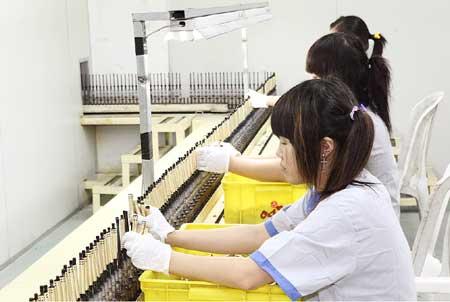
Workers check products at Chenglu Group in Ningbo. Provided to China Daily
NINGBO, Zhejiang province - Times are changing in Ningbo and so are the manufacturing processes. Modern machinery is replacing human hands to not only reduce costs but also boost output.The wheels of change have percolated down to even small manufacturing units like pen makers in Ningbo.
At a pen assembly line of Chenglu Group Co Ltd, dozens of workers are busy screwing nibs onto penholders.
That is a far cry from the past when the entire process was done manually. Modern machinery and facilities have taken on the work now.
The writing instrument maker and exporter in April this year installed additional facilities at its factories to improve efficiency and use less labor.
Summing up the situation, Chen Yong, general manager said the choice was a necessity driven as labor costs had shot through the roof recently.
That just sums up the plight of most of the companies in the region, as rising labor costs have more or less crippled most of the factories, while others have had to resort to upgrades of manufacturing facilities to stay afloat.
"You just can't find enough workers, and for the ones you hire, you have to pay more," said Chen.
Chenglu used to pay its assembly line workers at 1,200 yuan ($176) a month last year. But the wages have now gone up to nearly 1,800 yuan a month due to the labor shortage in the region, Chen said.
"You can't rely on cheap labor any more," he said.
Left with no choice, the company had to invest nearly 1 million yuan to upgrade and install new machinery at its manufacturing unit, like devices to combine different parts of a pen. At the same time, it also reduced the manual input in manufacturing by reducing the number of pen varieties from 800 to 80.
The twin strategies, Chen said, have helped the company to do only the necessary machinery upgrades and focus on core products.
The new machinery has helped Chenglu improve work efficiency by 20 to 70 percent. Though the machines are not exact replacements of human hands, the company was able to trim its workforce to 200 from 800 in 2007.
But Chen says this alone is not enough.
Currently only a small part of the manufacturing is done with the new facilities. To achieve economies of scale the company will have to make huge investments to significantly overhaul and modernize its production lines.
Chen said he expects annual revenues to reach 150 million yuan this year, with a profit margin of about 7 percent.





